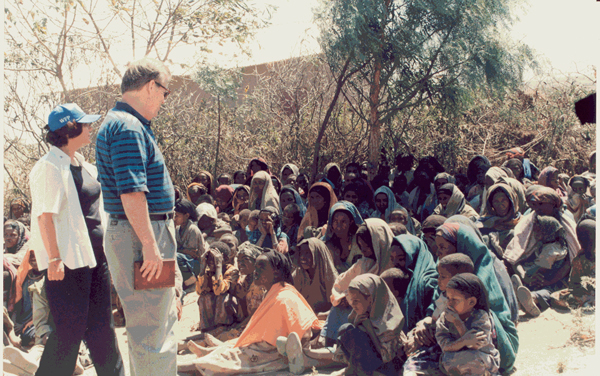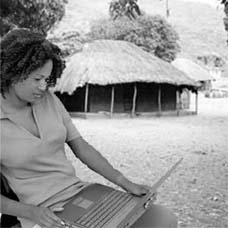
Tony Hall, the U.S. ambassador to the U.N. World Food Program, said the outcome of land seizures in Sudan could be tragic. ''The effects of this could be horrendous. Even if you get the displaced to go home, they would not own their land anymore. They might have to rent it or be forever homeless. I think we would then see a conflict and death toll that would be horrifying.''
Law may take land from farmers driven off of it
Darfur: If Sudan imposes the obscure provision, it may unleash an endless cycle of violence
By Emily Wax
The Washington Post
Government-backed militiamen have pushed more than a million Darfurians off their farmland, which now may be imperiled by a Sudanese tenure law. (Jahi Chikwendiu/The Washington Post )
NYALA, Sudan - The name ''Darfur'' comes from the Arabic word ''dar,'' meaning home, and ''fur,'' the largest African tribe in this war-ravaged region.
But more than a million Darfurians, driven from their ancestral homelands by government-backed Arab militias, could lose their land if authorities invoke a little-known law that allows the government to take over land abandoned for one year, relief officials and human rights groups said.
For centuries, Darfur residents have been allowed to own and distribute their land according to tribal customs. The rest of Sudan, however, is governed by the 1984 Sudan land tenure law. If imposed on Darfur, it would have dire implications for 1.7 million displaced inhabitants now living in squalid camps in Sudan or neighboring Chad. As tens of thousands of Darfurians approach the anniversary of fleeing their villages, there is growing suspicion among U.N. observers and international human rights groups that the Sudanese government plans to use the obscure law to keep the displaced - mostly African farmers - from reclaiming their land.
With government and rebel attacks continuing in the countryside, many families in the refugee camps are still afraid to go home. Most are unaware of the law, which states that after one year their land can be immediately taken over by new owners, who could legally claim the property in court after living on it for 10 consecutive years.
In recent weeks, tense conversations have been held between the government and U.N. and relief officials, who say they fear the outcome of land seizures could be tragic.
The U.N. Food and Agriculture Organization has called for a forum on the issue, saying that if the law is applied and the international community does not pressure the government to suspend it, the result could be an endless cycle of anger and bloodshed in Darfur, where land is the primary form of wealth.
''There has to be a lot of pressure . . . to send a clear message: Don't do this,'' said Tony Hall, the U.S. ambassador to the U.N. World Food Program, who visited Nyala, the capital of South Darfur, recently. ''The effects of this could be horrendous. Even if you get the displaced to go home, they would not own their land anymore. They might have to rent it or be forever homeless. I think we would then see a conflict and death toll that would be horrifying.''
The law cuts to the heart of the conflict in the rugged farm region of Darfur, where increasingly long droughts and the gradual advance of the Sahara Desert over the last two decades - at six miles a year - have sent Arab herders south onto largely African tribal land.
There have been periodic clashes over land, including a three-year war in the 1990s when the governor in Geneina, the capital of West Darfur, decided to give some land to a group of Arabs. The land belonged to the African Masalit tribe, and the results were violent: 312 Masalits and 220 Arabs dead; 606 Masalit huts and 902 Arab huts burned. As this type of tension continued to grow, farmers, students and political activists from three of Darfur's African tribes started a rebellion in February 2003 against the government, complaining that the Arab ruling elite had failed to develop the area.
Arab nomads, called on by the government to help put down the rebellion, responded by burning farms and villages, looting livestock, destroying wells and pillaging stored grain. The government also bombed villages, leaving roofless huts and huge craters.
The Bush administration has termed the atrocities genocide, but the Sudanese government insists they are the result of civil war started by rebels. Analysts said official efforts to move populations, part of a plan to solidify power and control resources, have been going on for decades.
So far, government officials have made varying comments on the land abandonment law, with some saying they have the full right to use it and others saying they are open to suspending it.
Hussain Ibrahim Karshoum, a lawyer who directs the government Humanitarian Affairs Commission overseeing refugee camps in South Darfur, said the longer displaced families remain in the camps, the ''more complicated'' their land situation may become.
''It's true, this law is there and we could use it,'' he said. ''But Sudanese law is very flexible. It adopts to the customs of the people. I am going to suggest that in Darfur we make a special enactment to suspend this law. Otherwise, yes, it's true, we will have big problems in Darfur.''
The Sudanese interior minister, Maj. Gen. Abdul-Rahim Mohammed Hussein, also said that the government had the right to apply the law but that it could also be ignored.
''We have the right, but it might cause too much damage,'' he said in an interview. ''We think the people should go back to their homes and they should get their land back.''
Even so, Darfur is a vast area - about the size of France - where local authorities with their own agenda may determine land policies.
''In the Darfur context, this law is a huge, dangerous problem,'' said Ghazi Suleiman, a human rights lawyer and leading opposition figure in Sudan. ''And it's not even public knowledge yet. It will be something to watch.''
Noureen Mohamed Yusif, another lawyer in Nyala, said that if the law was not suspended, ''there will be fighting. There will be killing.'' A scholarly man in a nearly pressed suit, Yusif said he had been arrested twice and imprisoned for two months after discussing the law with concerned tribal leaders.
But he said he was determined to inform displaced families about the law and the risks it could represent. On a recent afternoon, he met with another group of camp leaders and explained the legal situation to them.
''This can't be,'' said Mustafa Adam Moussa, 46, whose family had lived on their land for three generations before being driven off in October by a militia attack. ''They can't do this to us.''
''They can,'' Yusif whispered. ''And they might.''







